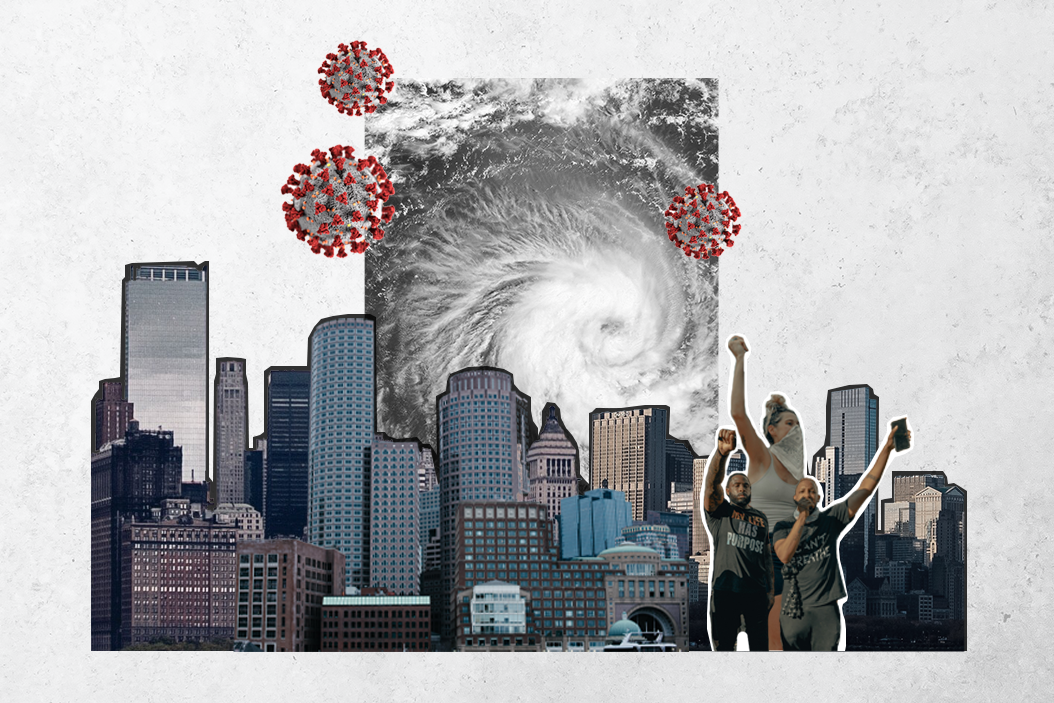We live on an (increasingly) urban planet. Today, for the first time in human history, more than half of the world's population (55 percent) lives in cities. By 2050, that figure will rise to more than two-thirds, with close to 7 billion people living in urban areas. Cities have always been centers of opportunity, innovation, and human progress. But they are also often on the front lines of the major political and social challenges of the day. Here are three areas in which that's true right now.
Climate change. Cities are hugely vulnerable to climate change and will have to take the lead in efforts to contain and adapt to it. More than 90 percent of the world's cities lie in coastal areas exposed to rising sea levels. At the same time, large cities' traffic, transport infrastructure, and buildings are responsible for 75 percent of global carbon emissions.
The major global climate change agreements — like the Paris Accord — exist at the national level, but implementation falls largely on cities. Many large cities are already taking the lead on their own — in some cases (as in the US currently) working at cross purposes with national leaders who are climate skeptics.
Technology. Urban planners are excited about "smart cities" where digital technologies (including sensors and cameras deployed across the city) can make the city more efficient, less polluted, and more responsive to citizens' needs. But there are two big political issues here.
First, who's watching all of this? All of those data flows have to be monitored and safeguarded by someone. As cities get "smarter" they'll wrestle with politically fraught tradeoffs between urban efficiency and personal privacy.
Second, who's making all of this? Smart cities require next generation 5G networks. Right now, the most cost-effective manufacturers of 5G equipment are Chinese companies. But the US government has banned them at home over national security fears and is pressuring other countries to do the same. As the world slouches towards a bigger US-China tech divide, cities that want the technologies of the future will be caught in the middle.
Pandemic. All of the things that make cities vibrant centers of progress and innovation – density, diversity, strong connections with the rest of the world – will also leave them sitting ducks for outbreaks of contagious disease. That's been particularly true of the coronavirus pandemic. COVID-19 first spread in a city (Wuhan, China — population 10 million) and since then, the overwhelming majority of the disease's victims have been in cities. In the US, for example, a study in June found that more than 94 percent of all cases (and deaths) have been in urban areas.
When we talk about the devastating impacts of the pandemic, and particularly its disproportionate public health and economic effects on minorities, the poor, and women, we are talking primarily about urban crises.
Polarization. No matter who wins next week's US presidential election, the electoral map is likely to be a sea of red (many less densely populated precincts that voted Republican) with large islands of blue (Democrat-leaning cities). But that political divergence between more liberal big cities and more conservative towns and rural areas isn't just an American phenomenon.
In 2016, for example, Londoners overwhelmingly votedagainst Brexit. Poland's recent presidential election was similar, a right-wing conservative beat a liberal big city mayor by drawing votes from the countryside. In Turkey, strongman president Recep Tayyip Erdoğan is least popular in the big cities, particularly his hometown of Istanbul, which his party lost control of last year.
The political divergence between town and country, and between cities and national governments, will become increasingly acute as cities grow and gain more economic power.
More For You
Americans are moving less — and renting more. Cooling migration and rising vacancy rates, especially across the Sunbelt, have flattened rent growth and given renters new leverage. For many lower-income households, that relief is beginning to show up in discretionary spending. Explore what's changing in US housing by subscribing to Bank of America Institute.
Most Popular
Walmart’s commitment to US-made products
What’s Good Wednesdays™, February 4, 2026
1,170: The number of high-rise buildings in Kyiv that were left without heating following a barrage of Russian attacks last night on Ukraine’s capital and its energy facilities, per Kyiv Mayor Vitali Klitschko.
Over the past five years, Haiti has endured extreme political turmoil, escalating violence, and one of the world’s worst humanitarian crises.
Microsoft unveiled a new set of commitments guiding its community‑first approach to AI infrastructure development. The strategy focuses on energy affordability, water efficiency, job creation, local investment, and AI‑driven skilling. As demand for digital infrastructure accelerates, the company is pushing a new model for responsible datacenter growth — one built on sustainability, economic mobility, and long‑term partnership with the communities that host it. The move signals how AI infrastructure is reshaping local economies and what people expect from the tech shaping their future. Read the full blog here.
